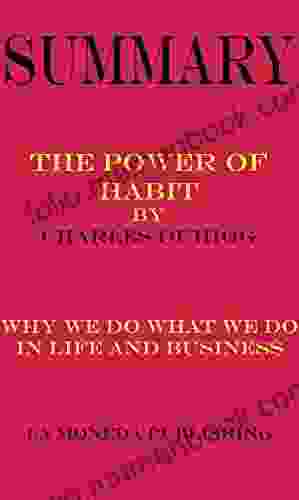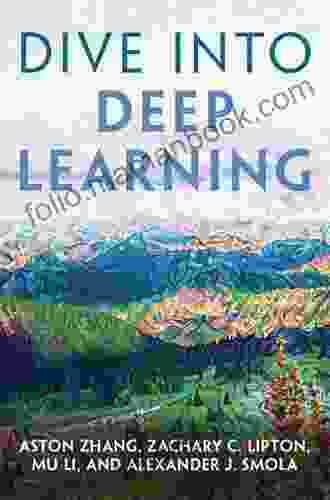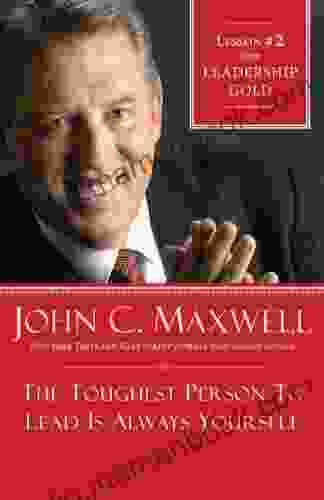Why We Do What We Do in Life & Business: Key Concepts from Charles Duhigg's Book

In his groundbreaking book, "The Power of Habit," Charles Duhigg delves into the fascinating science behind habits, revealing how they shape our lives and businesses. With captivating storytelling and rigorous research, Duhigg offers a framework for understanding why we do what we do, and provides practical strategies for creating lasting change.
4.5 out of 5
| Language | : | English |
| File size | : | 170 KB |
| Text-to-Speech | : | Enabled |
| Enhanced typesetting | : | Enabled |
| Word Wise | : | Enabled |
| Print length | : | 19 pages |
| Screen Reader | : | Supported |
15 Key Concepts from "The Power of Habit"
- Habits Are Automatic: Habits are learned behaviors that become automatic over time, allowing us to perform actions without conscious thought.
- Habits Consist of a Cue, Routine, and Reward: Every habit follows a three-step cycle: a cue triggers a routine, which leads to a reward.
- Cues Can Be Internal or External: Cues can be environmental triggers (e.g., a sight or sound) or internal cues (e.g., a thought or emotion).
- Routines Are the Visible Part of Habits: Routines are the actions we take in response to cues, and they are what we typically think of when we say "habit."
- Rewards Reinforce Habits: Rewards are the positive consequences that follow a routine, and they motivate us to repeat the behavior in the future.
- Habits Can Be Changed: While habits are automatic, they are not unchangeable. By understanding the habit loop, we can identify and alter the cues, routines, or rewards that drive our habits.
- Creating New Habits Takes Time and Effort: Forming new habits requires consistent effort and repetition. It is not an instantaneous process, but with patience and perseverance, new habits can become second nature.
- Habits Can Be Good or Bad: Habits can be positive (e.g., exercising regularly) or negative (e.g., smoking). Understanding the habit loop can help us cultivate good habits and break bad ones.
- Habits Are Contextual: Habits are often tied to specific contexts (e.g., a particular time or place). By changing the context, we can change our habits.
- Habits Can Be Broken Down: Complex habits can be broken down into smaller, more manageable steps, making them easier to change.
- Habit Formation Requires a "Golden Rule": To establish a new habit, start with a small, achievable step and repeat it regularly in the same context.
- Habits Can Be "Anchored" to Existing Habits: By linking new habits to existing ones, we can increase their likelihood of sticking.
- Habits Can Be Influenced by Social Context: Our social environment can shape our habits, so it is important to surround ourselves with people who support our goals.
- Habits Can Be Changed Through Self-Awareness: By paying attention to our cues, routines, and rewards, we can become more aware of our habits and make intentional changes.
- Habit Change Is a Journey, Not a Destination: Changing habits requires ongoing effort and adjustment. Don't get discouraged by setbacks; view them as opportunities for learning and improvement.
Applying Key Concepts to Life and Business
Duhigg's key concepts can be applied to various aspects of life and business to help us understand and improve our habits:
- Personal Productivity: By identifying the cues and rewards that trigger our habits, we can create routines that support our productivity goals.
- Health and Wellness: Understanding the habit loop can help us develop healthy habits (e.g., exercising regularly, eating healthy) and break unhealthy ones (e.g., smoking, overeating).
- Business Success: Organizations can use Duhigg's principles to create habits that drive success, such as fostering innovation, improving customer service, and increasing operational efficiency.
- Leadership: Leaders can use their understanding of habits to inspire and motivate their teams, create a positive work culture, and achieve organizational goals.
Charles Duhigg's "The Power of Habit" provides a transformative understanding of why we do what we do in life and business. By grasping the key concepts of habit formation and change, we can take control of our behaviors, create positive habits, and break negative ones. Whether we seek personal growth, improved health, or business success, embracing the science of habits can empower us to achieve our goals and live more fulfilling lives.
4.5 out of 5
| Language | : | English |
| File size | : | 170 KB |
| Text-to-Speech | : | Enabled |
| Enhanced typesetting | : | Enabled |
| Word Wise | : | Enabled |
| Print length | : | 19 pages |
| Screen Reader | : | Supported |
Do you want to contribute by writing guest posts on this blog?
Please contact us and send us a resume of previous articles that you have written.
 Top Book
Top Book Novel
Novel Fiction
Fiction Nonfiction
Nonfiction Literature
Literature Paperback
Paperback Hardcover
Hardcover E-book
E-book Audiobook
Audiobook Bestseller
Bestseller Classic
Classic Mystery
Mystery Thriller
Thriller Romance
Romance Fantasy
Fantasy Science Fiction
Science Fiction Biography
Biography Memoir
Memoir Autobiography
Autobiography Poetry
Poetry Drama
Drama Historical Fiction
Historical Fiction Self-help
Self-help Young Adult
Young Adult Childrens Books
Childrens Books Graphic Novel
Graphic Novel Anthology
Anthology Series
Series Encyclopedia
Encyclopedia Reference
Reference Guidebook
Guidebook Textbook
Textbook Workbook
Workbook Journal
Journal Diary
Diary Manuscript
Manuscript Folio
Folio Pulp Fiction
Pulp Fiction Short Stories
Short Stories Fairy Tales
Fairy Tales Fables
Fables Mythology
Mythology Philosophy
Philosophy Religion
Religion Spirituality
Spirituality Essays
Essays Critique
Critique Commentary
Commentary Glossary
Glossary Bibliography
Bibliography Index
Index Table of Contents
Table of Contents Preface
Preface Introduction
Introduction Foreword
Foreword Afterword
Afterword Appendices
Appendices Annotations
Annotations Footnotes
Footnotes Epilogue
Epilogue Prologue
Prologue Margaret James
Margaret James Dylanna Press
Dylanna Press Tristan Johnson
Tristan Johnson Victoria Waller
Victoria Waller Roger Zelazny
Roger Zelazny Shan Wee
Shan Wee Esther Crain
Esther Crain Kristen Stein
Kristen Stein Cindy Horn
Cindy Horn Jimmy Soni
Jimmy Soni Angela Grassi
Angela Grassi Stella Tartsinis
Stella Tartsinis Pam Denicolo
Pam Denicolo John Pirillo
John Pirillo Maria Cizmic
Maria Cizmic Reyna Biddy
Reyna Biddy Mark Stone
Mark Stone Makenzie Campbell
Makenzie Campbell Elaine Hall
Elaine Hall Leon Stevens
Leon Stevens
Light bulbAdvertise smarter! Our strategic ad space ensures maximum exposure. Reserve your spot today!

 Michael ChabonDiscover the Enchanting World of 73 Poems That Rhyme by Kay Moody: A Journey...
Michael ChabonDiscover the Enchanting World of 73 Poems That Rhyme by Kay Moody: A Journey... Harold BlairFollow ·10.9k
Harold BlairFollow ·10.9k Connor MitchellFollow ·11.8k
Connor MitchellFollow ·11.8k Alan TurnerFollow ·10.7k
Alan TurnerFollow ·10.7k Virginia WoolfFollow ·10k
Virginia WoolfFollow ·10k Eric HayesFollow ·14.6k
Eric HayesFollow ·14.6k Griffin MitchellFollow ·7.7k
Griffin MitchellFollow ·7.7k George Bernard ShawFollow ·14.2k
George Bernard ShawFollow ·14.2k Dallas TurnerFollow ·15.4k
Dallas TurnerFollow ·15.4k
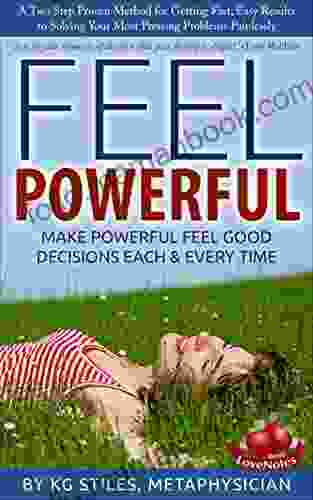
 Dean Cox
Dean CoxHow to Make Decisions Easily & Effortlessly: The...
The Different Types of Decisions There...
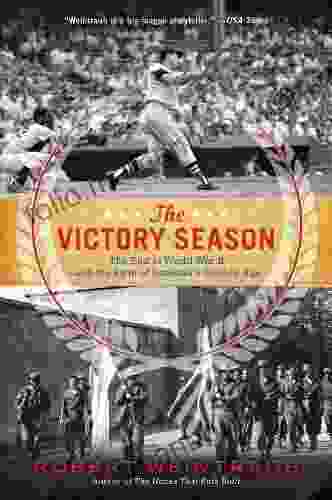
 Gustavo Cox
Gustavo CoxThe End of World War II and the Birth of Baseball's...
The end of...

 Patrick Rothfuss
Patrick RothfussThe Dantes: An 11-Family Saga of Billionaires, Soulmates,...
The Dantes is an epic family saga that follows...
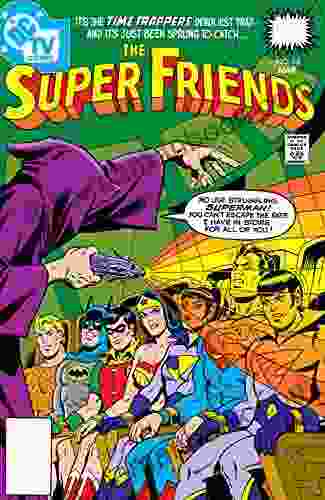
 Dylan Mitchell
Dylan MitchellSuper Friends: The Animated Adventures That Defined a...
In the vibrant landscape of American...
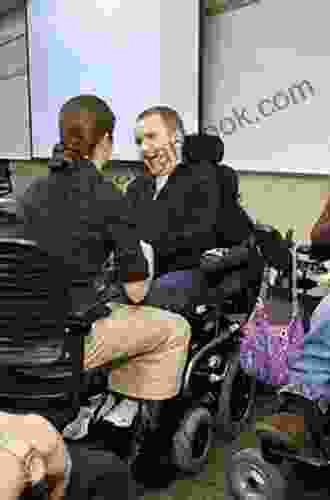
 Jamal Blair
Jamal BlairCollege For Students With Disabilities: We Do Belong
College can be a...
4.5 out of 5
| Language | : | English |
| File size | : | 170 KB |
| Text-to-Speech | : | Enabled |
| Enhanced typesetting | : | Enabled |
| Word Wise | : | Enabled |
| Print length | : | 19 pages |
| Screen Reader | : | Supported |


